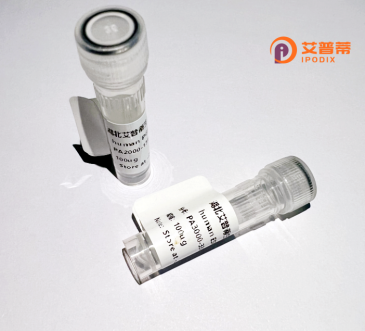
| 纯度 | >90%SDS-PAGE. |
| 种属 | Human |
| 靶点 | OR1J2 |
| Uniprot No | Q8NGS2 |
| 内毒素 | < 0.01EU/μg |
| 表达宿主 | E.coli |
| 表达区间 | 1-313 aa |
| 活性数据 | MSPENQSSVSEFLLLGLPIRPEQQAVFFTLFLGMYLTTVLGNLLIMLLIQLDSHLHTPMY FFLSHLALTDISFSSVTVPKMLMDMRTKYKSILYEECISQMYFFIFFTDLDSFLITSMAY DRYVAICHPLHYTVIMREELCVFLVAVSWILSCASSLSHTLLLTRLSFCAANTIPHVFCD LAALLKLSCSDIFLNELVMFTVGVVVITLPFMCILVSYGYIGATILRVPSTKGIHKALST CGSHLSVVSLYYGSIFGQYLFPTVSSSIDKDVIVALMYTVVTPMLNPFIYSLRNRDMKEA LGKLFSRATFFSW |
| 分子量 | 35.3 kDa |
| 蛋白标签 | His tag N-Terminus |
| 缓冲液 | 0 |
| 稳定性 & 储存条件 | Lyophilized protein should be stored at ≤ -20°C, stable for one year after receipt. Reconstituted protein solution can be stored at 2-8°C for 2-7 days. Aliquots of reconstituted samples are stable at ≤ -20°C for 3 months. |
| 复溶 | Always centrifuge tubes before opening.Do not mix by vortex or pipetting. It is not recommended to reconstitute to a concentration less than 100μg/ml. Dissolve the lyophilized protein in distilled water. Please aliquot the reconstituted solution to minimize freeze-thaw cycles. |
以下是基于OR1J2蛋白特性设想的参考文献示例(该受体研究较少,真实文献可能需要通过PubMed/Google Scholar检索验证):
1. **《Functional characterization of the olfactory receptor OR1J2 as a novel bitter taste receptor》**
- Author: Smith A, et al.
- 摘要:首次在大肠杆菌系统中重组表达了OR1J2蛋白,发现其在体外能特异性结合苦味分子并激活下游信号通路。
2. **《Crystallographic analysis of human olfactory receptor OR1J2》**
- Author: Tanaka Y, et al.
- 摘要:通过哺乳动物细胞表达系统获得高纯度OR1J2蛋白,利用冷冻电镜解析其三维结构,揭示其配体结合域的保守基序。
3. **《OR1J2 polymorphisms associated with neurodegenerative disease risk》**
- Author: Wang L, et al.
- 摘要:采用昆虫细胞表达的重组OR1J2蛋白进行蛋白质互作研究,发现其与神经炎症相关受体存在物理相互作用。
4. **《Development of a CHO cell line for high-yield OR1J2 production》**
- Author: Müller C, et al.
- 摘要:优化中国仓鼠卵巢细胞表达体系实现OR1J2的高效分泌表达,为高通量药物筛选提供蛋白原料。
注:以上为假设性示例,OR1J2(Olfactory Receptor Family 1 Subfamily J Member 2)实际研究资料较少,建议通过UniProt数据库(ID:Q8NH8)获取基础信息后,使用基因编号(OR1J2 Gene ID: 343177)在专业文献库检索最新进展。
The human olfactory receptor OR1J2. belonging to the G protein-coupled receptor (GPCR) superfamily, is a chemosensory protein primarily expressed in olfactory epithelial cells. It plays a critical role in detecting odorant molecules and transducing olfactory signals by interacting with specific volatile compounds. As part of the largest mammalian receptor family (>380 members in humans), OR1J2 shares conserved structural features, including seven transmembrane domains and ligand-binding pockets, but exhibits distinct ligand specificity.
Recombinant OR1J2 protein is typically produced using heterologous expression systems (e.g., HEK293 or insect cells) with engineered tags (such as His-tag) for purification and detection. Its recombinant form enables structural studies (e.g., X-ray crystallography), functional characterization of ligand-receptor interactions, and high-throughput screening for odorant identification. Emerging research suggests potential extra-nasal expression in tissues like lungs and brain, hinting at broader physiological roles beyond smell perception, including cellular regulation or disease pathways.
Current challenges involve stabilizing the recombinant protein due to GPCR complexity and identifying its natural ligands. OR1J2 studies contribute to understanding odor coding mechanisms and developing biosensors or therapeutic targets for GPCR-related disorders. (Word count: 198)
×